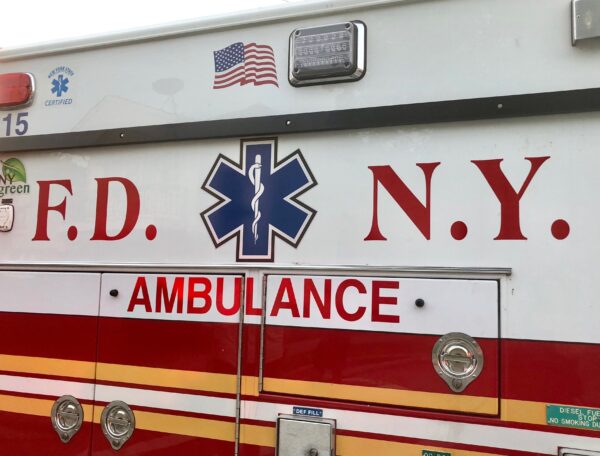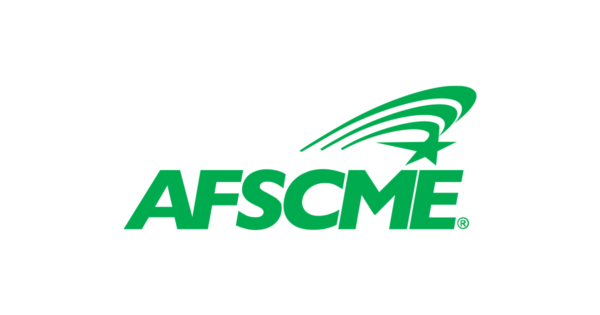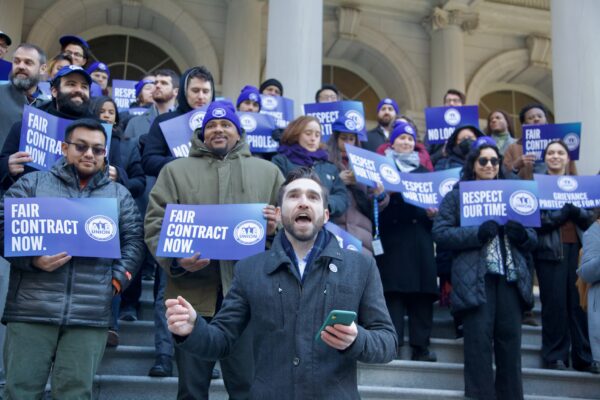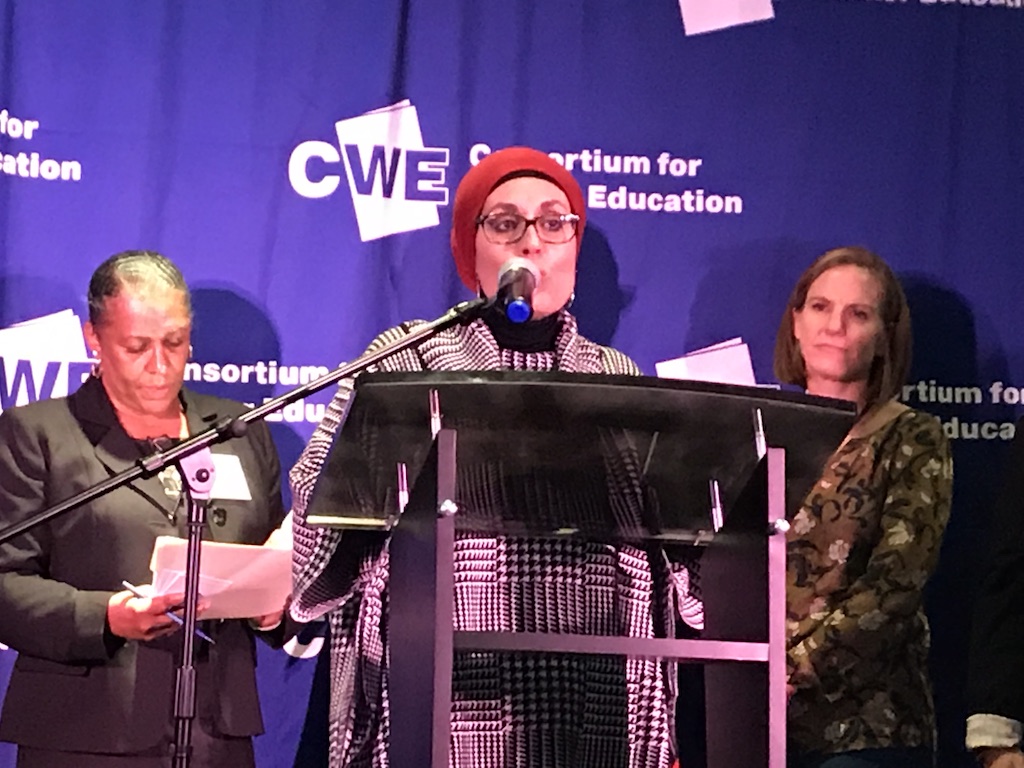
NEW YORK, N.Y.—“You’re standing in the space I built,” says Robin Sokoloff, who runs Town Stages, an arts and events space in Tribeca that hosted an open house for the Consortium for Worker Education Nov. 19.
CWE helped create the path for her to get there, Sokoloff says. An actress and dancer, she was unemployed during the Great Recession and decided she wanted to become a carpenter. That led her to Nontraditional Employment for Women, a program CWE funds that prepares women for building-trades apprenticeships, which led to her getting into Carpenters Local 157.
“I’m living proof that it works,” Sokoloff says.
CWE, founded in 1985, describes itself as “the workforce-development arm of the New York City Central Labor Council,” providing job training and skills upgrading to union members and other New Yorkers. It has expanded over the years to support programs such as English classes for immigrants and subsidizing child care for working people—“and more recently, immigrants’ rights,” says Teamsters Joint Council 16 President George Miranda, chair of CWE’s board.
The goal, he adds, is to support workers not just on the job, but “where they live.”
CWE executive director Joseph McDermott calls the organization “a veritable university of workers.” In the last year, he told the gathering, 80,000 people took 5,000 classes it supported, and 25,000 people got instruction about immigrants’ rights. More than 60 groups attended the event, including labor unions such as District Council 37 and the International Union of Operating Engineers, along with “worker centers,” job-training programs, and community and nonprofit organizations including the Restaurant Opportunities Centers, Urban Upbound from Long Island City, and Catholic Charities Community Services.
“We wouldn’t be able to do it without them,” says Erik Antokal of NEW. Aided by funding from the City Council’s Jobs to Build On program, which is cosponsored by the Central Labor Council and CWE, NEW graduates 225 to 300 women a year. Last year, he adds, the Building and Construction Trades Council increased its set-aside for NEW graduates to 15% of apprentices, possibly another 50 to 80 slots.
“NEW has given me the greatest opportunity,” says Laborers Local 79 member Limary Montijo, 38. She learned about the program from her wife, who had gone through the program, and graduated six years ago. “The excitement of construction was in my blood,” she says, recalling her grandfather, a “man of all trades” in Puerto Rico,” and union wages enable her to support her four children on one job instead of three.
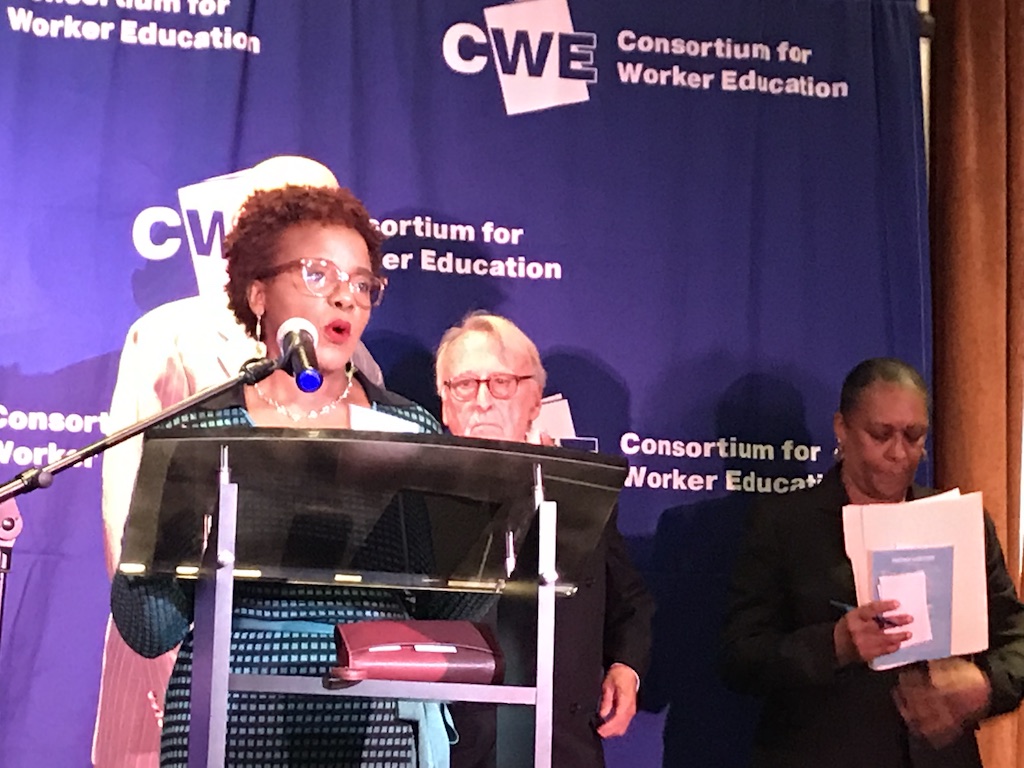
One obstacle to parents working, especially women, is finding child care: Licensed care for a baby costs more than $19,000 a year without subsidies, says Jocelyn Mazurkiewicz, an organizer with the New York Union Child Care Coalition. But New York City only guarantees subsidies to families poor enough to be eligible for public assistance. To help working parents who fall in the gap, the coalition has developed the Child Care Facilitated Enrollment Project, administered by CWE. It provides subsidies averaging $5,000 each for about 800 children whose parents make up to 275% of the poverty level, or about $58,700 for a family of three.
Most of the parents in the program are union members, says Mazurkiewicz, but “you don’t have to be a union member to be eligible.”
CWE and Workers United also run English and computer-skills classes for garment-workers union’s members, and are expanding them to the nail-salon workers it’s trying to organize—currently for Spanish speakers, and soon for Chinese speakers. The program, says Sherry Kane of CWE, asked workers “what kinds of things they needed in English”—primarily language they could use on the job and talking to doctors and their children’s teachers—and incorporated it into the curriculum.
When the Trump administration expanded deportations to hunt down undocumented immigrants without criminal records, Make the Road New York called CWE, said codirector Deborah Axt. It “helped weave together organizations working on similar issues but not necessarily connected,” she told LaborPress.
Those immigrants’ rights efforts, Axt says, included helping unions develop contract language to protect immigrants, advising shop stewards on how to deal with Immigration and Customs Enforcement raids, teaching immigrants that “ICE can’t knock down your door without a warrant,” and having parents prepare emergency “plans for their children if someone disappears.”
Another immigrant-aid effort CWE supported is the Yemeni American Merchants Association, founded after Trump banned issuing visas to people from Yemen and several other Muslim-majority countries. “I had no idea what CWE was,” says Dr. Debbie Almontaser, the association’s founder, but Joseph McDermott had asked to meet with the group, and she knew it could help with education.
The association developed an education program for Yemeni bodega owners, many of whom needed help understanding the city’s business regulations. But 90% of the people in it are bodega owners’ wives, says Almontaser. The men work 12 to 16 hours a day and don’t have time, she explains, and the women want to become more independent and be able to help support their relatives in war-ravaged Yemen.
McDermott told the gathering that facing the challenge of the gig economy, of jobs being transformed into temporary and casual work, the labor movement has to “increase our mandate to protect workers.”
“No doubt, we have to hold on to our W-2s,” he said. But in the long run, he added, the best way to ensure that workers can reap the fruits of their labor would be developing worker-owned cooperatives.

